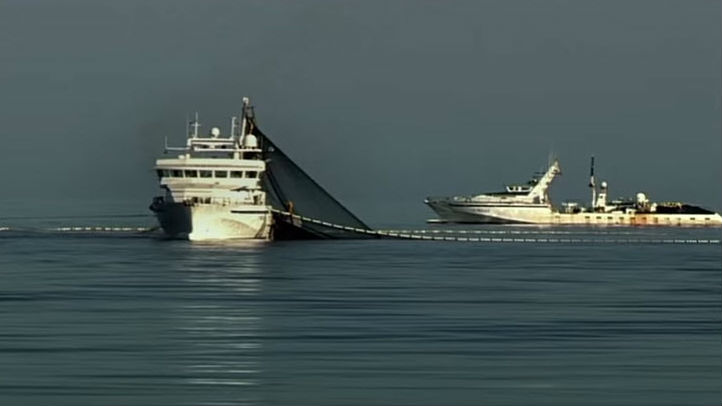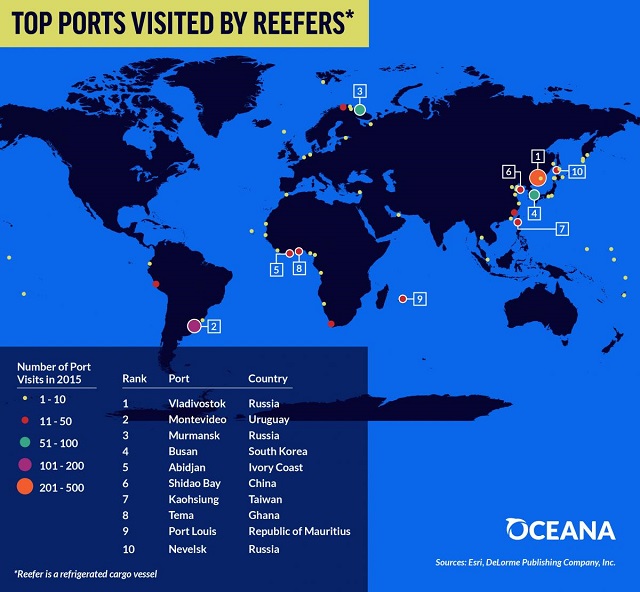No More Hiding at Sea

Environmental organization Oceana has released a report exposing the global scale of transshipping at sea, a practice that can mask illegal fishing practices and conceal human rights abuses.
The report, which was released at The Economist’s World Ocean Summit in Bali, Indonesia, uses a new dataset released by Global Fishing Watch and Oceana’s partner SkyTruth to identify likely transshipping hotspots.
.jpg) Fishing vessels and refrigerated cargo vessels rendezvous at sea in order to transfer seafood, fuel or supplies. While this transshipping practice can be legal in many cases, it also can facilitate the laundering of illegally caught fish, especially on the high seas and in waters surrounding developing and small island nations with insufficient resources to police their waters, says Oceana.
Fishing vessels and refrigerated cargo vessels rendezvous at sea in order to transfer seafood, fuel or supplies. While this transshipping practice can be legal in many cases, it also can facilitate the laundering of illegally caught fish, especially on the high seas and in waters surrounding developing and small island nations with insufficient resources to police their waters, says Oceana.
Transshipping enables fishing vessels to remain at sea for extended periods of time, and Oceana highlighted two fishing vessels involved in suspected transshipping that remained at sea for more than 500 days in 2015 and 2016.
.jpg)
.jpg) Currently, three of the top eight countries that reefers most often frequented (China, Ivory Coast and Taiwan) have not yet ratified the FAO Port State Measures Agreement to Prevent, Deter and Eliminate Illegal, Unreported and Unregulated Fishing. Oceana says this begs the question: Are these reefers intentionally using ports of convenience to offload illegal catch and take advantage of loopholes in enforcement?
Currently, three of the top eight countries that reefers most often frequented (China, Ivory Coast and Taiwan) have not yet ratified the FAO Port State Measures Agreement to Prevent, Deter and Eliminate Illegal, Unreported and Unregulated Fishing. Oceana says this begs the question: Are these reefers intentionally using ports of convenience to offload illegal catch and take advantage of loopholes in enforcement?
Jacqueline Savitz, Senior Vice President for the United States and Global Fishing Watch at Oceana, says: “When fishing vessels that remain at sea for many months at a time can hide the amounts of fish they are catching and selling, it makes it difficult to enforce sustainable fishing laws. This prevents fisheries managers from maintaining healthy fish populations and rebuilding those that are overfished – a necessary process especially given global food security concerns.
“By avoiding scrutiny at port, captains can conceal suspicious activities like illegal fishing, human rights abuses and seafood fraud. The only way to ensure an end to illicit activities on our oceans is to ban transshipping at sea, require vessel tracking for all fishing vessels and establish consistent seafood catch reporting requirements worldwide.”
 Currently, fish provide 3.1 billion people with 20 percent of their animal protein intake, and millions of people rely on the oceans as a source of income. According to the FAO, an estimated 56.6 million people are employed as fishers and fish farmers, of which small-scale fisheries play a critical role in supporting livelihoods and alleviating poverty for millions of people living in coastal communities. With 89.5 percent of the world’s fisheries already fully exploited or overfished, there is an imminent threat to the food and job security for millions of people, especially those living in developing countries that rely on the ocean’s bounty for survival, says Oceana.
Currently, fish provide 3.1 billion people with 20 percent of their animal protein intake, and millions of people rely on the oceans as a source of income. According to the FAO, an estimated 56.6 million people are employed as fishers and fish farmers, of which small-scale fisheries play a critical role in supporting livelihoods and alleviating poverty for millions of people living in coastal communities. With 89.5 percent of the world’s fisheries already fully exploited or overfished, there is an imminent threat to the food and job security for millions of people, especially those living in developing countries that rely on the ocean’s bounty for survival, says Oceana.
Highlights from the report’s findings include:
• Almost 40 percent of all suspected transshipping events occurred on the high seas, beyond national jurisdictions.
• High densities of suspected transshipping were revealed in Russia’s Sea of Okhotsk, the high-seas waters of the Barents Sea, the national waters of Guinea-Bissau and immediately outside of the national waters of Argentina and Peru.
• Of the suspected transshipping events worldwide, 50 percent occurred within Russian waters.
• In 2016, Russian-flagged fishing vessels ranked highest for the average number of suspected rendezvous per vessel in a national fleet.
• Comoros and Vanuatu were the second and third highest-ranked countries for the average number of suspected transshipping events per vessel in a national fleet during 2016.
Top ports visited by refrigerated cargo vessels engaged in suspected transshipping in 2015 include Vladivostok, Russia; Montevideo, Uruguay; Murmansk, Russia; and Busan, South Korea.
The report is available here.
